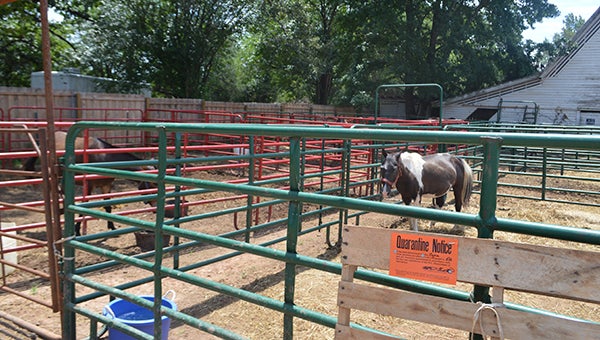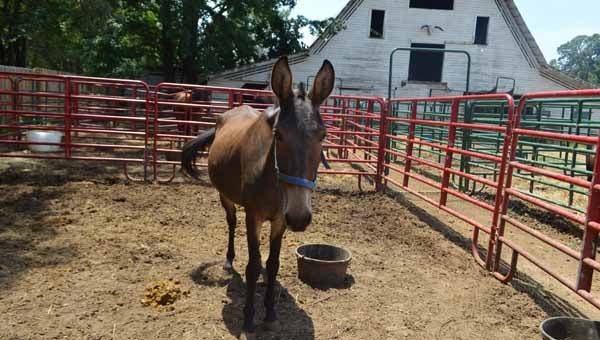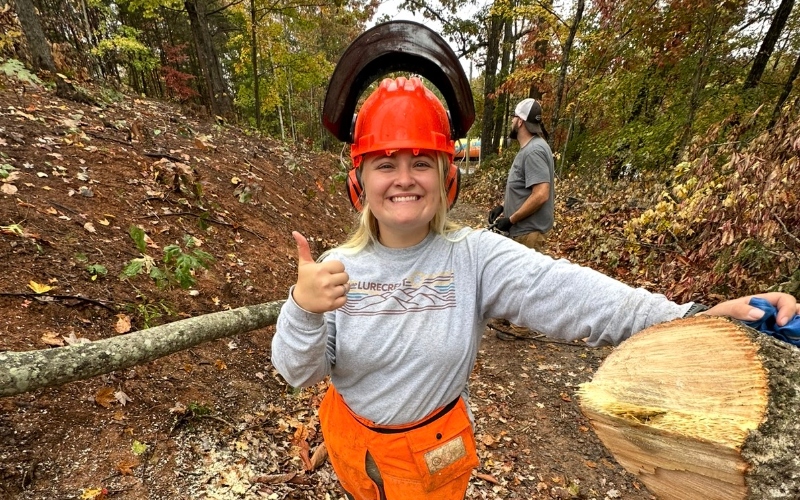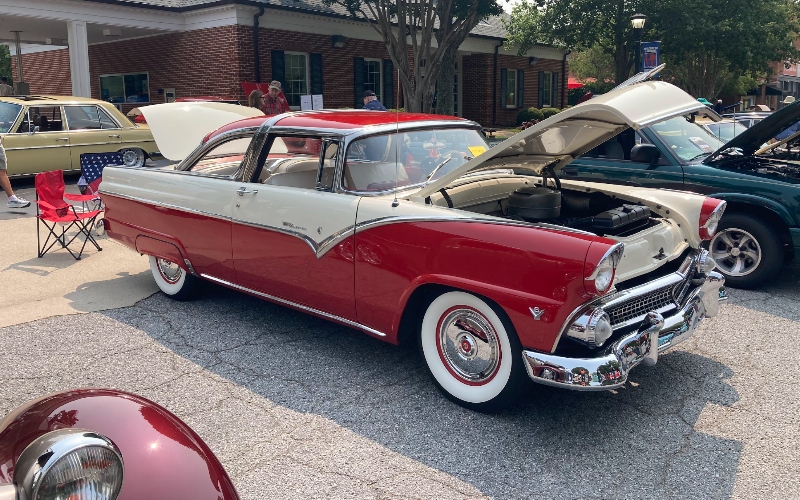Green Creek business facing suspension amidst horse slaughter controversy
Published 2:40 am Wednesday, August 3, 2016

An orange quarantine notice has been posted by the N.C. Department of Agriculture on the property used by Justin Scott White on Chesnee Hwy. in Green Creek. White’s business, Southeastern Cattle Company, operates the Facebook page Carolina Feedlots, which posts photos of horses available for purchase that have been bought at auction. The state has suspended his livestock license due to his inability to produce proper health paperwork on his animals. (Photo by Michael O’Hearn)
GREEN CREEK – A Green Creek business is facing a 120-day suspension following an investigation by the Polk County Sheriff’s Department and the North Carolina Department of Agriculture and Consumer Services.
According to Sgt. Michael Herman, animal control officer with the Polk County Sheriff’s Department, Justin Scott White and his Southeastern Cattle Company business was issued a quarantine notice by the North Carolina Department of Agriculture on Friday, July 29. Herman added that White could not be given criminal charges, though several penalties had been issued by the state agriculture department.
The Department of Agriculture issued three $2,500 civil penalties to White, totaling $7,500 in fines under the authority of Steven Troxler, the state’s commissioner of agriculture.
The Southeastern Cattle Company is operating under White’s Carolina Feedlots Facebook page. White has 15 days from July 29 to provide documentation to the state that he has been under compliance in regards to Coggins health tests necessary to transport horses across state lines and all other necessary paperwork.
“We, the sheriff’s department, assisted the Department of Agriculture in filing paperwork with the civil penalties through the department,” Herman explained Tuesday. “The suspension of the livestock license is through the Department of Agriculture. There were no criminal charges through Polk County.”
Polk County Sheriff Donald Hill added that he has been trying for the past year to press charges against White, saying he got several state agencies involved in trying to track down any criminal wrongdoing. Hill said White was cited for bringing horses in without proper paperwork and fined somewhere out west in June.
“We got a court order from Judge Peter Knight on Friday to go check it out, and we’re waiting to see what the Department of Agriculture is going to do now,” Hill said. “They are going to check in today (Tuesday) on the quarantine. I’ve gotten the Department of Justice involved, the state commerce department involved because he’s selling things on the computers, state vets and even the attorney general’s department involved. They have found he’s doing nothing illegal.”
According to the violation notice sent by Jennifer Kendrick, public information officer with the North Carolina Department of Agriculture, two state veterinarians went to Carolina Feedlots in February to interview White about two complaints filed in relation to his business. The document was signed by Dr. R. Douglas Meckes, a state veterinarian.

A horse stands in a pen at White’s Carolina Feedlots on Chesnee Hwy. in Green Creek Tuesday. (Photos by Michael O’Hearn)
The veterinarians asked White to produce invoices, equine infectious anemia (EIA) test charts and interstate certificates of veterinary inspections (ICVIs). White was unable to produce these records for the veterinarians, and a verbal warning had been issued pertaining to his responsibilities as a livestock dealer.
“We have been investigating Justin White for a couple of months now and he’s gotten a lot of complaints from people,” Kendrick said. “There’s not a lot under the law that people have been complaining about that we can actually regulate. He is bringing horses into the state without interstate veterinarian health inspections and negative Coggins tests. There have been complaints about the health of the animals, which would be a criminal issue with the local sheriff’s office, but that’s not our jurisdiction.”
State veterinarians were then sent out to White’s business in May on another complaint, this time concerning a horse moved across state lines to Georgia, according to the violation notice document. It was then that White admitted that five more horses came across state lines without their interstate certificates of veterinary inspections, citing the horses were ill and the veterinarian refused to issue these certificates for interstate transportation. A second verbal warning was issued by state veterinarians with a review of White’s responsibilities as a dealer.
“He’s got 16 other horses out there currently without paperwork and they are currently under quarantine,” Kendrick explained. “The building was under quarantine last week, and we’ll get blood work back today (Tuesday) and if they come back negative, the quarantine will then be released. If there’s a positive horse, then there will be a continued quarantine on the building but that’s a whole other issue if we have any positives on the EIAs.”
A visit to Carolina Feedlots by state veterinarians in June produced results that White had recently purchased five horses from Oklahoma without the proper paperwork necessary for the inspections or health tests. White initially told the veterinarians he purchased the five horses locally. He was reminded by state veterinarians that this was the third time this year he did not have the paperwork required by the inspectors.
On Friday, the start day of the quarantine, Hill said there had been six or seven more horses found without proper paperwork and noted it was a state violation. Herman added improper paperwork caused the suspension Friday.
“Improper paperwork, that’s the nature of the bust,” Herman said. “The Polk County Sheriff’s Department assisted the Department of Agriculture with the papers served and the civil penalties. There were no charges to come out of it.”
A daily check on the horses that have been quarantined has been ordered by Judge Knight to the sheriff’s department in assisting the Department of Agriculture in carrying these checks out, according to Hill. This order was also handed down on Friday.
“The problem is he’s buying the horses, and you can’t charge the buyer with the conditions the horses are in when he buys them,” Hill said. “We’ve had complaints about this horse being in a condition, and the vet will come out and he (Herman) will go out and come to find out what had been said was wrong isn’t even wrong with the horse. There have been times I thought, we’ve been watching and trying, and certain things fell through.”
Herman said every time he’s been out to Green Creek, the animals have been treated humanely with food, water and veterinarian care. Herman added the problem with White’s business is the controversy of having a “killer buyer” in Polk County.
“They buy horses for the slaughter,” Herman said. “Some do keep them temporarily, but most of the time they are supposed to go straight to slaughter. Kill buyer is a slang term for someone who buys killer horses. Some will try to find homes for them before they take them to slaughter.”
“All of the animals have been treated humanely. They’ve had food, water and vet care. He’s going to buy skinny horses or horses that are not in the greatest health and hold them for 10 to 12 days before shipping them off to Mexico,” Herman said. “So, he’s buying, this is my opinion, he’s buying somebody else’s problem and then he’s taking care of the problem. The problem with this whole situation is the people don’t want a killer buyer in Polk County. The only way to get rid of killer buyers is educate horse owners on how to take care of their animals and don’t overbreed them, basically.”
Hill said this issue boils down to what is morally right, in his mind, adding the community’s heartstrings are being pulled on for both animal and horse lovers alike.
“He violated the state law, he messed up and he got caught because he didn’t comply with state law,” Hill explained. “I think, me personally, I got a bad problem, and I think a lot of people do too, I’ve got an issue with it because I think morally it’s wrong. If I could charge people with what I thought was morally wrong, I would arrest a lot of people. As for what he’s doing, to me, and a lot of other people can look at it the same way, he’s pulling on the heartstrings of the horse lovers and the people who love animals.”
White would not speak with reporters Tuesday, but the Carolina Feedlots Facebook page describes the business as “a kill lot located in Columbus, North Carolina. We are not a rescue in anyway. We are trying to make a difference and offer as many horses as possible that come through this lot a chance at a loving forever home by posting them on this page! … It’s not the horses fault they ended up where they did. They may have been took to auction to pay bills, or no longer needed, or old and worn out, or simply just couldn’t be cared for anymore. The horse doesn’t have a say in its destiny so we need to pull together quickly and save as many as possible and be their voice. All the horses will have a shipping date and if their full amount to bail them out is not paid the horse will ship on the load. … Each horse will include in its bail fee a coggins, health certificate if crossing state lines, and microchipped for identification. Also we would suggest if you would like vaccinations done you do so at that time. We do suggest that you quarantine the horse for 30 days when you get them home if you have other horses due to the horse being in the feedlot and coming from auctions. WE ARE NOT A RESCUE. We are not a non-profit. There is a lot of work involved for the people helping and if it weren’t for them these horses wouldn’t have a chance at a forever home. It takes everyone’s help!”





